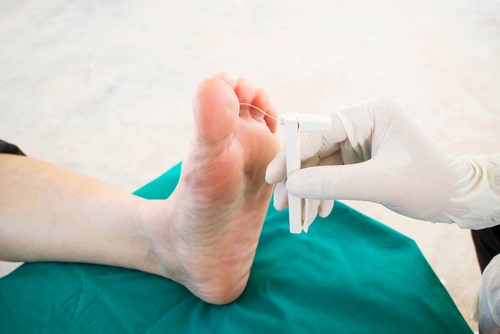
Diabetic foot ulcer facts
It is very important to be aware of the dangers of foot ulcers if you or someone you love has diabetes. You should know:
- A foot ulcer is an open wound on the foot. They can be dangerous because a person who has had diabetes for a long time may have lost some feeling in the feet, so they don’t even know that they have a wound until it becomes infected.
- Up to 25% of people with diabetes will develop foot ulcers. This is why it is common practice for doctors to check a diabetic’s feet every time they come in for an appointment.
- A foot ulcer can start out as a very small, seemingly harmless injury, such as a wound from stepping on something sharp or even from very dry skin.
- If left untreated, a foot ulcer can lead to infection or even eventually the need for amputation.
- A foot ulcer can be a symptom of peripheral artery disease (PAD), a circulation problem where the limbs don’t get enough blood. This lack of blood flow can interfere with the healing of a wound. Other symptoms of PAD include blue toes, feet, or legs; toe nails that don’t grow; pain in the legs; and a lack of leg hair.
- Your risk for diabetic foot ulcers increases if you are overweight or smoke.
If you have diabetes, it is important to check your feet often for any signs of a wound, and if you think you may have a diabetic foot ulcer, don’t wait to contact your doctor. Getting treatment early is very important to prevent infection and other, even more serious, problems. Contact the Glendale, Arizona, office of Dr. Sammy A. Zakhary, today! Call (623) 258-3255 for an appointment.

